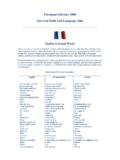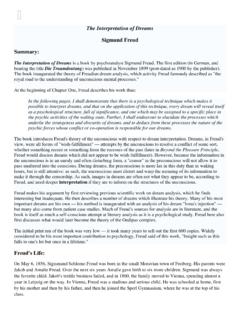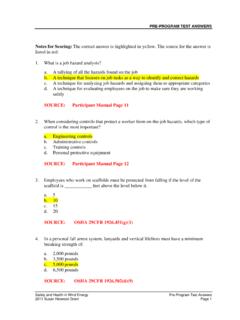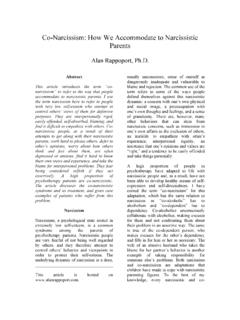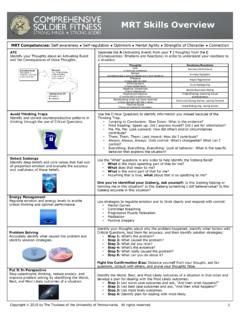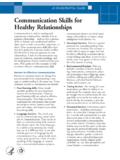Transcription of How to Communicate Assertively and Respectfully
1 How to Communicate Assertivelyand RespectfullyGraciela Gris ScenarioWisconsin DHFS Caregiver Project:Prevent ~ Protect ~ PromoteHHoowwttooCCoommmmuunniiccaatteeA AsssseerrttiivveellyyaannddRReessppeecct tffuullllyyAssertiveness is the ability to honestly express your opinions, feelings, attitudes,and rights in a way that respects the rights of of us are taught that we should always concede or defer to others. We learnthat it is selfish to considerour needs above those of others and if someone doessomething we don t like, we should just be quiet and stay away from that person inthe future. However,assertive communicationis important because it helpsusavoid: Resentment. Anger at others for manipulating or taking advantage of me. Frustration. How could I be such a wimp? Why did I let them walkall over me? Anxiety and Avoidance. If you begin to avoid situations or people thatyou know will make you uncomfortable, you may miss out on funactivities, job opportunities, relationships, and lots of other good planning your assertive behavior, remember that the other person is used toyou behaving in a certain way and may be confused when you change yourcommunication style.
2 Tell the other person up front what you're trying to a peaceful moment for this:"I need to tell you something and I'd like you to hear me out before youcomment. I've noticed lately that after wework on a project together, Ifind myself feeling frustrated and overwhelmed. I've been thinkingabout it and I've realized that Itend to go along with your ideas withoutinsisting onconsideration of my ideas as well, because I'm afraid ofupsetting you. From now on,I'm going to try something I start tofeel frustrated, I'm going to ask that we stop beforemaking a final decision and be sure we ve considered allof our know that will be a change for you, but I think it's fair and I know I'lldo a better job and feel better about myself if I can tell you my ideas."How to Communicate Assertivelyand RespectfullyGraciela Gris ScenarioWisconsin DHFS Caregiver Project:Prevent ~ Protect ~ PromoteAssertive communication with others has three important : Try to say something that shows your understanding of theother person's feelings.
3 This shows the other person that you're not trying to picka fight and it takes the wind out of their sails. For example:"I know that you get anxious when you'reready to go and I'm not .." of problem: Thispiece describes your difficulty ordissatisfactionwith the situation and tells why you need something to change. For example:".. but when you do that, I get all flustered and take even more the time we get in the car, we're mad at each other and not muchin the mood to have a good time." of what you want: This is a specific request for a specific change inthe other person's behavior. For example: "From now on, let's be sure we know what time we want to leave, andif you're ready before I am, will you please just go to another roomand read the paper or watch TV?"How to be effectively assertive: Use assertive body language. Face the other person, stand or sit straight,don't use dismissive gestures, be sure you have a pleasant, but serious, facialexpression, keep your voice calm and soft, not whiney or abrasive.
4 Use "I" statements. Focus on the problem you're having, not on accusing orblaming the other :"I'd like to tell my stories withoutinterruption." instead of"You're always interrupting my stories! Use facts, not judgments. Example:"Your punctuation needs work and yourformatting is inconsistent" instead of"This is sloppy work." or"Did youknow that shirt has some spots?" instead of"You're not going out lookinglike THAT, are you?" Expressownership of your thoughts, feelings, and :"I getangry when he breaks his promises." instead of"He makes me angry." or"Ibelieve the best policy is " instead of"The only sensible thing is to .." Make clear, direct requests. Don't invite the person to say no. Example:"Will you please .. ?" instead of"Would you mind .. ?"Adapted from Vivian Barnette, PhD, ~
